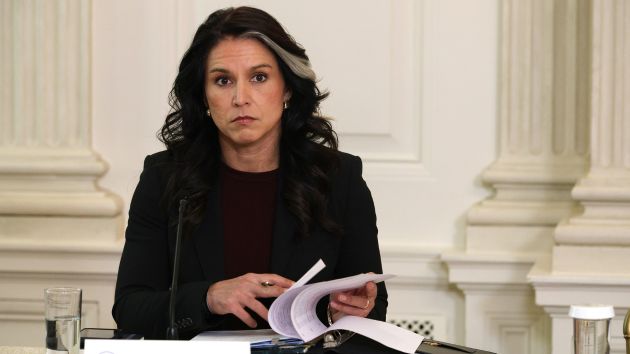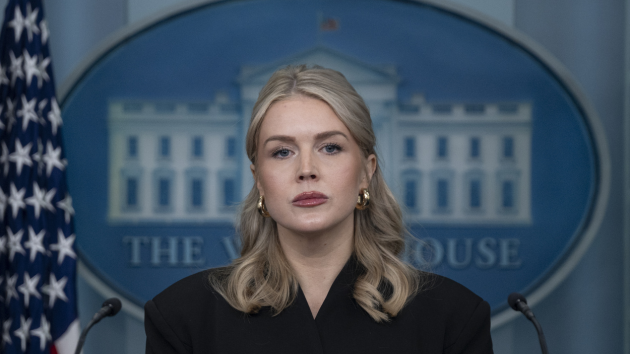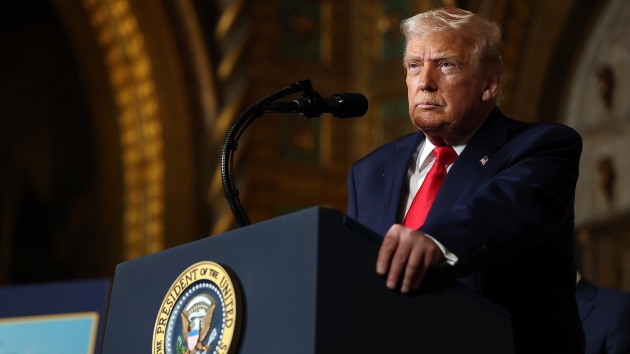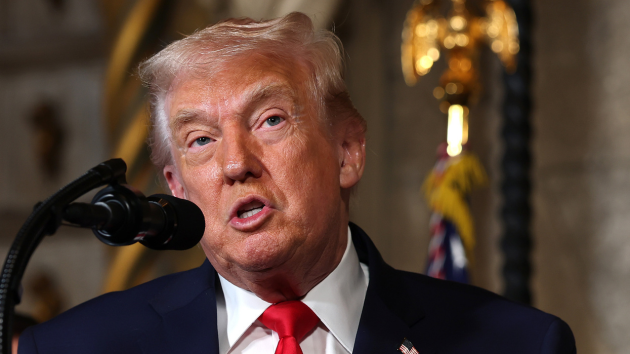Gabbard says she still sees terrorism as the defining threat to America
Written by ABC Audio ALL RIGHTS RESERVED on November 15, 2025

(NEW YORK) — Director of National Intelligence Tulsi Gabbard’s path to service began in the uncertain moments after 9/11 when fears of terrorism reshaped both the country and her own sense of duty. She’s a lieutenant colonel in the Army Reserve and the first person in U.S. history to serve as DNI while in military uniform.
Two decades later, she told ABC News in an exclusive interview, the same early lessons still guide her approach to leadership, and that the resurgence of terrorism remains her greatest concern.
A principled independence or shifting with political winds
Allies often describe Gabbard as disciplined and mission-driven, shaped by the rigors of military life. Yet some former colleagues say the former Democrat’s views increasingly aligned with the Republican Party she once criticized. Admirers see a principled independence; detractors see a political evolution that mirrors Washington’s shifting winds. Gabbard, however, says her compass has never changed, only the terrain around her.
From her congressional campaigns to the 2020 presidential race, Gabbard was one of the only candidates treating foreign policy as a defining issue. While some of her domestic exchanges on the trail went viral, her presidential campaign remained grounded in her foreign policy message. Her events drew a mix of supporters across party lines, many of whom responded to her foreign policy message of a once-rising Democrat whose view of the world at times clashed with her party’s establishment.
For Gabbard, the focus of her public life and private moments has always been service, and days like Veterans Day are personal.
“It’s a day where I think about the great Americans I’ve had the opportunity to serve with now for 22 and a half years,” she said. “What does it mean for me in the mission that I have as director of national intelligence? It’s personal, because it’s about people. It’s both the people that I’ve had the opportunity to serve with and had the opportunity to lead, and it’s the people who paid the ultimate price who never got to make that trip home.”
A life shaped by deployments, a worldview shaped by war
In 2021, Gabbard deployed to the Horn of Africa. She told ABC News she spent time working with the Somali government along with other armed forces across the continent who had “a singular mission of defeating al-Shabaab, which is affiliated with al-Qaeda, and one of the biggest financial funders of al-Qaeda in that region.”
“The reality is that Islamist terrorism continues to pose the greatest — both short- and long-term — threat to the American people on freedom and Western civilization,” Gabbard said. “The reason why I enlisted in the military has been at the forefront in going after these Islamist terrorists, and remained at the forefront.”
She said ODNI, working with federal and local partners, has “thwarted some of these lone wolf actors who, in some cases, are becoming harder to find,” noting that the threat has evolved from structured networks overseas to individuals radicalized online or inspired remotely.
Her focus on Islamist terrorism has also drawn criticism at times, with some accusing her of Islamophobia, a charge she rejects.
As a Democratic member of Congress and a Democratic National Committee vice chair, Gabbard publicly broke with much of her party over the Obama administration’s reluctance to describe ISIS as an Islamist extremist group, drawing praise from some Republicans and sharp pushback from Democratic leadership, cementing her reputation as someone willing to challenge her own side on national security.
“Unfortunately, a lot of politicians are too afraid to speak the truth about this because they are afraid of the political backlash they may get being called Islamophobes and so forth,” Gabbard said. “They watch what happened to me, but this has come at the cost of our own security and the threat to our freedom.”
That experience reinforced what first called her to serve, the belief that the threat never truly disappeared, only evolved. Gabbard warned that the danger today is as much ideological as operational, spreading through propaganda and recruitment networks that reach far beyond the battlefield.
“There were a lot of people who came into our country over the last four years who either are known or suspected terrorists or who have ties to them. I’m concerned about the folks that we don’t know about, that have not been identified or vetted, and the increasing spread of Islamist propaganda that we’re seeing coming from al-Qaeda.”
“This directly connects back to why I enlisted in the military. It was the Islamist terrorist attack on 9/11 that motivated me to do that in recognizing the seriousness of the threat and wanting to do my part to serve my country and defeat these terrorists who attacked us on that day,” she said.
A Washington outsider leading its most insider institution
For much of her adult life, Gabbard has lived in dual worlds, public servant and soldier, balancing the discipline of command with the weight of national decision making. The lessons she learned in uniform, she said, continue to inform how she approaches her civilian post.
During Army training in Texas, every morning at 4:30 a.m. her squad leader played Tim McGraw’s “Live Like You Were Dying.” She said that daily reminder shaped her perspective on service and mortality, foreshadowing the lessons she would carry into Iraq. She was stationed at Camp Anaconda at Joint Base Balad, located in the Sunni Triangle, 40 miles north of Baghdad, nicknamed “Mortaritaville” for its constant rocket and mortar attacks, often with little or no warning. Within hours of her arrival in Iraq, she would survive her first mortar attack.
The next morning, Gabbard noticed a sign that said “IS TODAY THE DAY?” that would be a daily occurrence on the main security gate. Over the years, that one question, once literal, has remained her daily reminder of how fleeting life can be and how purpose defines sacrifice.
That sense of purpose, Gabbard said, has always been grounded in faith — including the Bible and Bhagavad Gita texts.
“Spending time in prayer, not only every morning and every night, but at every opportunity, reminded me how fragile our time on this earth is,” she said.
The weight of service and the price of conflict
The stress of that initial deployment in her mid-20s would turn her hair white. It eventually darkened again, but Gabbard has kept a streak of white hair as a physical reminder of the human cost of war and what she describes as her mission to seek and fight for peace.
“War must always be the last resort, only after all measures of diplomacy have been completely exhausted,” Gabbard said.
Last week, at the 21st International Institute for Strategic Studies Manama Dialogue in Bahrain, a Gulf security summit that brings together officials to debate regional strategy, Gabbard warned against what she called “the mistakes of the past,” including U.S.-led regime-change wars.
Gabbard reflected on her speech, telling ABC News the focus was “pointing out the destructive effects of our country’s history of regime-change wars, not only these wars being wars of choice, incredibly costly in ways that are really impossible to measure in human life that was lost, as well as ultimately undermining our security,” she said. “Regime-change war in Iraq, for example, is what led to the rise of al-Qaeda and ISIS and their strengthening of their positions and their proliferation, not only around the region, but around the world.”
Pushing back against criticism of isolationism
Gabbard also pushed back on critics who describe the Trump administration’s America First policy as isolationist.
“People will say that America First equates to some policy about isolationism, and that’s simply not true,” she argued. “It’s very obvious how robustly President Trump engages with world leaders on a daily basis.”
“One of the biggest changes within the intelligence community, from a focus and resource standpoint under President Trump, has come about in focusing on what is actually happening here in our own backyard in the Western Hemisphere,” she said. “This has not been a focus for many previous administrations, and because of that we’ve seen and experienced the effects of these cartels and transnational criminal organizations really being emboldened, not only to wreak havoc and terror, trafficking of very dangerous and deadly drugs, trafficking in humans and babies.”
She said the intelligence community, under the president’s direction, has begun reallocating resources to map who is driving those operations and how to dismantle them.
‘This has never been about politics’
Supporters see those reforms as proof of Gabbard’s willingness to challenge bureaucracy and redirect the intelligence community’s focus toward real-world threats. But her critics, including Sen. Mark Warner, the top Democrat on the Senate Intelligence Committee, say the shakeup has come at a steep cost.
In a September speech, Warner accused Gabbard and Trump of “systematically undermining the independence of the nation’s intelligence community,” pointing to firings, revoked clearances, and reassignments he said had “silenced decades of expertise.”
“At stake,” Warner warned, “is whether America will continue to have an intelligence community free to speak truth to power.”
Gabbard’s allies have dismissed those claims as politics. They argue the criticism misses the point, that “ODNI 2.0,” as she calls her overhaul, is about cutting through layers of stagnation and rebuilding trust between intelligence officers and the commander in chief.
“I love our country, and it continues to be a very special thing to serve alongside the less than 1% of Americans who volunteer to put their lives on the line to defend the safety, security and freedom of the American people,” she said. “So long as I feel I can serve in a way that’s impactful and meaningful, I’m grateful.”
That sense of purpose still drives her.
“For me, this has never been about politics,” she said. “It’s about service. Service to country, service to others, and making sure the truth reaches the people who make the hardest decisions.”
“If I was interested in serving myself, I would be in Hawaii on a surfboard right now, living the easy life with my family in the place that we are grateful to call home,” she said. “My purpose in life is to do my very best to love and serve God.”
Copyright © 2025, ABC Audio. All rights reserved.





